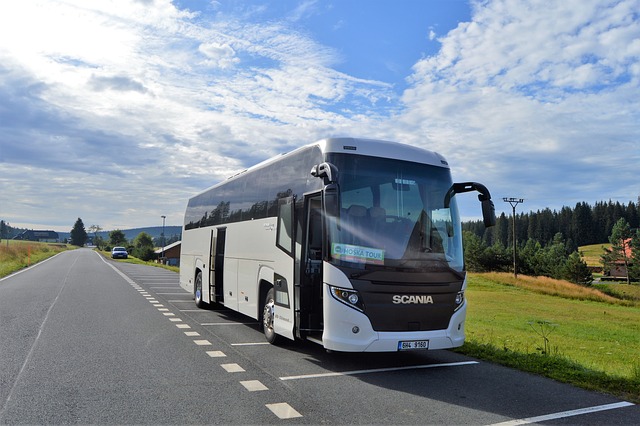Destination Zero: How BIO-CIRCLE are supporting the coach industry’s journey to Destination Zero
UK coaches set to reach net zero emissions by 2040 to stay ahead
BIO-CIRCLE is a surface cleaning technology company. How can we help?

▲Buses emit only 1/6 of the carbon dioxide emissions of cars
(Source: https://www.bio-circle.co.uk)
Did you know that long-distance bus travel is already the greenest way to see the UK? Average CO2 emissions per passenger per journey are around 1.5 times lower than rail, 5 times lower than aviation and 6 times lower than cars.
However, while this gentle giant mode of transportation is green, it can get even greener, with the industry tasked with achieving net-zero emissions by 2040. Graham Vidler, chief executive of the Passenger Transport Federation, said: “The passenger car industry is determined to stay ahead on the path to net zero emissions.”
In order to assist the industry in achieving its goals, the ZECT (Zero Emission Coach Team) task force was established. Through their report titled "Roadmap to Zero Emissions," they aim to identify optimal pathways towards achieving net-zero emissions.
Their report endeavors to identify potential solutions, establish collaborations with other key stakeholders, and align a series of commitments from governments and industries to ensure a feasible transition to zero-emission technologies. The report outlines three critical areas that will make significant contributions to the industry's decarbonization goals:
- Transition technologies such as low-carbon fuels (e.g., biodiesel and HVO) are being used while the industry awaits the development of hydrogen-powered vehicles and improvements in electric battery ranges. Additionally, retrofitting existing vehicles for electric power and recharging infrastructure enhancements are being explored.
- Confidence in purchasing zero-emission vehicles is increasing among operators through case studies, trials, certification programs, and adjustments to laws related to axle weight restrictions. Zero-emission vehicles are usually much heavier.
- Supporting infrastructure for zero-emission passenger vehicles involves implementing reliable refueling networks where vehicles from any operator can refuel, regardless of ownership of the garage.
How does BIO-CIRCLE integrate into this?
The three areas emphasized by ZECT that contribute to achieving net-zero emissions can all benefit from the support of BIO-CIRCLE surface technology systems and cleaning agents. This is especially true when we shift the focus from the forefront of the passenger vehicle industry (the vehicles themselves) to the factories. After all, behind every zero-emission passenger vehicle, there needs to be an end-to-end zero-emission process for manufacturing, remanufacturing, retrofitting, maintenance, and repair at every stage.
(Further reading:Replaces solvent cleaning ~ The best choice for parts and maintenance cleaning, a cleaning solution that does not harm human health! )
- Transition Technologies: As the report highlights, a key component of transition technologies is the use of low-carbon fuels as industries shift towards electrification or hydrogen energy. However, let's examine the cleaning processes for maintenance and repair of passenger cars at stations across the UK. Some warehouses still utilize solvent-based part cleaning machines and hazardous cleaning agents to clean and degrease all parts (regardless of size). By simply switching to BIO-CIRCLE water-based cleaners that are VOC-free or VOC-reduced (meaning extremely low carbon emissions), operators can initiate the decarbonization process right from the workshop, thereby reducing waste chains, lowering costs, minimizing health and fire risks, and yielding numerous other benefits. As zero-emission vehicles become ready, so will the garages, with their basic maintenance procedures oriented towards the future, achieving net-zero emissions. Even when diesel is no longer in use for passenger cars, their engines, parts, and exteriors still require cleaning, making these changes important and relevant.
- Operators' confidence in purchasing zero-emission vehicles is continuously growing. Now, by investing in zero-emission or low-emission technologies within other processes in the industry (such as part preparation and surface cleaning technology) and seeing their effectiveness equal, if not surpass, outdated technologies, confidence in the entire new zero-emission technology will only be enhanced.
- Supporting Infrastructure for Zero-Emission Passenger Cars: Achieving net-zero emissions in public-facing operations is meaningless without zero-emission infrastructure as backend support. While the "infrastructure" in the ZECT report refers to implementing effective and accessible refueling networks throughout the UK (which is crucial, of course), "infrastructure" can also refer to smaller processes within passenger car operations, such as maintenance and repair, and the infrastructure supporting this. By making some small changes to infrastructure, such as switching brake cleaners to harmless BIO-CIRCLE cleaners or replacing odorous solvent-based part cleaners with pleasant water-based alternatives (meaning no need for personal protective equipment, dedicated cleaning areas, disposal of hazardous waste, etc.), the complementary infrastructure, as well as the overall infrastructure, will truly achieve net-zero.
CONTACT US
Kelly Chemical Corporation
Electronics
TEL:(02)2762-1985 ext 11200
Online Message
Leave your contact information,
and we will get in touch with you soon.
Email Consultation
After receiving your email,
we will process it as soon as possible.send Email